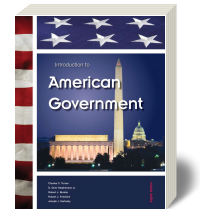Introduction to American Government
Eighth Edition Turner, et al., © 2016, 594 pages
Introduction to American Government provides students with a comprehensive, readable, and balanced study of the context, structure, and process of American politics. The text highlights the importance of economics and ideology in the context of American government.
Request Examination Copy Test Drive WebBookPrices and ISBNs
This title is available in the following formats.
|
Product
Description ISBN |
Description | ISBN | Bookstore (Net Price) |
Student (Retail Price) |
Supplements
The available Supplements are listed below:
Click here to access ancillaries save_altInstant Access (and Coupons)
All students can have free Instant Access to an eBook for the first two weeks of class while they procure their textbook. They will also receive a 10%-off coupon valid at the BVT web store for the best possible price. Get instant access codes here.
Instructor's Manual
The Instructor's Manual consists of lecture and discussion topics, chapter objectives, and project suggestions to better assist you with your teaching curriculum.Study Guide
This thorough and practical student study guide includes learning objectives, chapter outlines, questions, and ideas that help the student review material presented in the text. Also included are student activities and projects designed to enhance the practical application of the concepts.PowerPoint Slides
This PowerPoint slide set combines graphics and text to further illustrate the principles discussed in the text. Each chapter will contain around 20 PowerPoint slides summarizing learning objectives and chapter overview.Test Bank
The Test Bank contains multiple choice and true/false questions.Test Bank (Blackboard)
The Test Bank contains multiple choice and true/false questions. This file is an archive of per-chapter zipped Blackboard pool files.2017 Addendum
The goal of this supplement is to provide users of the eighth edition of Introduction to American Government with some of the context and reminders of the changes that have taken place in the past two years, since that edition went to press. Arguably, four of the most significant events of the past two years have been the constitutional recognition of marriage equality for same-sex couples, the changing partisan and demographic makeup of Congress, the judicial vacancy created by the death of Supreme Court justice Antonin Scalia, and the many surprising events surrounding the 2016 presidential election. For that reason, each topic receives its own discussion here.2017 Addendum Questions
Excerpts
The available Excerpts are listed below:
Description
This text highlights, in several ways, the importance of economics and ideology in the context of American government. The chapter on public policy and economics explores the relationship between politics and economics, as does a series of "Politics and Economics" boxes throughout the rest of the book. Students see how economic decisions have political consequences and how political decisions affect the economy. This is essential information in a day when economic topics frequently dominate electoral campaigns, television news, and conversation at the dinner table. However, the text assumes no prior knowledge of economics, and references to economic policy are free of confusing jargon.
Understanding differences among political beliefs is likewise essential at a time when the labels "liberal" and "conservative," "left" and "right" are hurled about. Such terms can be baffling, particularly because their meanings have not been consistent. Consequently, the text underscores the importance of political ideology - the ideas people have about what government should or should not do and what kind of government they should have. This emphasis is reflected in a series of "Politics and Ideas" boxes that appear throughout the text. The chapter on political ideologies is nearly unique among shorter volumes on American government because it draws a road map that guides students through intellectual debates, past and present, in American politics. Additionally, the chapter that deals with civil liberties and civil rights probes ideological distinctions among Americans concerning fundamental freedoms. Such an encompassing survey of the spectrum of political ideas encourages students both to comprehend and to tolerate points of view other than their own, enabling them to gain further insight into political differences that exist nationwide.
New to the Eighth Edition
American politics is a constantly changing montage of people and events, of facts and opinions. In order to keep up with our changing environment, and to make sure students have the most up-to-date information available, each new edition of Introduction to American Government undergoes a vigorous process of fact-checking and updating. In this edition, for example, readers will find revised weblinks and readings for further study; more critical thinking questions; and discussions of the latest events in American government - such as the 2014 elections, immigration reform, conflict with ISIS, racial tensions, and important Supreme Court decisions on same-sex marriage and on the First Amendment. In addition, each chapter contains important new material.

